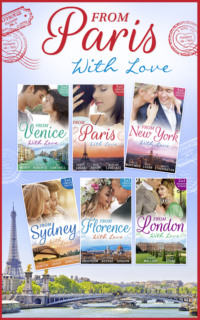Kitap dosya olarak indirilemez ancak uygulamamız üzerinden veya online olarak web sitemizden okunabilir.
Kitabı oku: «From Paris With Love Collection», sayfa 36
CHAPTER FIVE
MAYBE it was Natania’s cooking and the superb platter of frittura, the fried fish and calamari she had prepared, or maybe it was the rich risotto al nero di seppa made with squid ink, which Gabriella found surprisingly delicate, that served to soothe Raoul’s dark mood. Or maybe it was just that his appointment had gone well. But, whatever the reason, Raoul was back to his charming best when he returned to the apartment. When he suggested an evening walking-tour of Venice after dinner, she could not resist the chance to explore the city. The air was heavier tonight, full of humidity as a cooler change worked through, but for now it was still warm. Raoul reacquainted her with the big tourist sites, with the highly ornate Basilica di San Marco and the grand Palazzo Ducale in St Mark’s Square where once long ago she’d fed and raced after pigeons with her friends. He pointed out the domed bell-tower of San Giorgio Maggiore standing on its own island across the dark slapping waters. He took her to the Rialto Bridge, the stone wonder spanning the broad Grand Canal, its central portico lit up so it looked like a grand lady dressed up for a night out. Then he showed her places that were off the main trails, wending his way through the darkening city, showing her architectural treasures and little-known pictures carved into stone walls and known only to those who knew Venice beyond the tourist routes.
He could do this, he decided as he led her to a tiny trattoria overlooking the lagoon for coffee. He could force back that black tide inside him and be civil—pleasant, even. He could be interested and attentive. And he could do this not just because he had to but because he honestly wanted to know more about her, more about those lost years when he had missed out on knowing her.
‘What made you decide to become a librarian?’ he asked, watching the ends of her hair play on the soft breeze as she sat down. She’d tied her hair back in a loose knot behind her head before they’d come out, but tendrils had worked their way loose and now danced around her face. He envied them their playfulness. His fingertips itched to brush them away, to linger on her soft skin …
Their coffee arrived; she thanked the waiter and looked back at him, her eyes bright and clear, smoothing the hair from her brow and tucking it behind her ears. ‘I don’t think there was ever a time I didn’t want to do something to do with books. I actually think my profession chose me.’
He realised he liked listening to her too. He liked the sound of her accent, the blend of half-French, half-English, the best of both, Cognac over cream.
‘Tell me what you love about it,’ he urged.
‘It’s just working with books, all of them, every one of them an entire world between the covers. Every new one is a discovery and until you dip into them you just never know what’s inside: new worlds; new discoveries; new characters who leap off the page. It’s all there, just waiting for you to open the cover and turn the page.’
She was so bright, so passionate, and even while he felt the darkness rise, even as his gut churned and rebelled, still it was impossible not to feel that light shine out from her and warm him in places where light had not touched for so long.
‘The books in my library,’ he bit out, coming up with an idea that might hold her, something to keep her interest while she stayed. ‘I don’t even know what’s there.’
He watched her brow pucker as she sensed the almost-crime. ‘Maybe while I’m here—if you didn’t mind, that is—maybe I could look at them and catalogue them for you.’
‘You would do that for me?’
‘I would love to.’
She was so excited, he believed she would.
‘What about you?’ she asked as he finished his coffee, so suddenly that he was taken by surprise.
‘What about me?’
‘What have you been doing all these years?’
Standing still.
Trying to forget.
‘Nothing half as interesting as you.’
She tilted her head. ‘I was sorry to hear that your wife died. You were married such a short time.’
The black tide grew closer. ‘What did you hear?’
‘Only that there was some kind of tragic accident. But it’s such a long time ago now. Did you never think of remarrying?’
Never.
He pushed his chair back. ‘Why don’t we walk?’
A mist had grown while they’d sat in the café, rolling in over the sea, devouring everything in its path. Gabriella forgot about her question and thought there was something so utterly fascinating and serene about watching an entire world slowly vanish, a fantasy world disappearing into the fog as if it had never been real, as if it had never existed.
They found a bridge looking out over the water where the deepening mist rolled in over the lagoon, obliterating and absorbing everything, even sounds, so that it was as though Venice had been buried under a dank, white cloud. Every now and then a light would appear, or the dull rumble of an engine would herald the ghostly shape of a vessel making its way back to shore. She shivered. ‘Are you cold?’ he asked, putting his arm around her shoulders.
‘It’s spooky,’ she said, looking up at him. ‘Don’t you feel it?’
He looked out into the mist-covered lagoon and she wondered what he was looking for when all anyone could see was white. ‘The ghosts come out,’ he said, ‘When there is a night like this.’
‘Oh, Raoul, please,’ she said, trying to laugh while she fought down the prickles rising at the back of her neck and the shivers running down her spine. ‘I’m not a child you can frighten so easily.’
‘No, it is true. There are many, many ghosts in Venice. And many, many stories.’
And, because she had told him she was no longer a child and could not be frightened so easily, she felt she had no choice but to boldly ask, ‘Like what? Tell me one of your ghost stories, then.’
Still looking out in the mist, a look so intense it was almost enough to make her regret her rash challenge, he began, his voice low and heavy with foreboding. ‘Once there was a wealthy merchant who had the world at his feet. He had riches beyond measure—he was good-looking, some even said—and he had a beautiful wife, famous and talented. And he thought that he had it all. He thought that he was happy.’
She held her breath as the fog swirled silently around them, knowing this could not end well.
‘And then one night, a night filled with the pleasures of the flesh as so much of his life had become, he introduced his wife to two brothers, supposedly two friends of his. But the two brothers conspired against him. They promised the merchant’s wife the world and spirited her away.’
‘She went willingly?’
He shrugged. ‘Who can say? The man was a fool, you see, who saw nothing before him but his perfect life, and nothing afterwards but a blind rage. And when he found her one storm-ridden night, lying with one of the brothers, it almost destroyed him.’
‘What happened?’
‘They died that night, both the woman and her lover.’
‘The merchant killed them?’
‘He might as well have. Because she haunted him every night afterwards until he thought he was going mad with the darkness. And even now, on nights such as these, you can hear her voice on the mournful breeze calling for him, searching for him, waiting for him to pass by so she can suck him into the watery depths.’
Through the gloom of the fog the soft wind moaned and a light flickered faintly once, twice, before it disappeared back into the swirling fog. Gabriella grabbed hold of Raoul’s arm, chilled beyond measure. ‘It’s late,’ she said, trying not to tremble as she clung to him. ‘And it’s been a long day. Let’s go home.’
They walked back hand in hand, the soft lamps along their route and Raoul’s solid presence banishing thoughts of ghosts, legends and what must have been just wild imaginings, turning her thoughts away from the ghostly and much more towards the physical and the real. Her hand fitted well in his, she mused; his long fingers were warm and strong. She squeezed her hand and he squeezed back, looking down at her. ‘I want you to be happy, Bella. Are you glad you came to Venice?’
She smiled, thinking she would be happy to be with Raoul anywhere when he was like this—charming, warm and the perfect host. But to be here with him in Venice, against the backdrop of mediaeval palazzos, with the rumble of the vaporettos and the snatches of love songs from passing gondoliers, she couldn’t think of a better place to be. ‘It’s magical, Raoul. Thank you for insisting I come.’
He stopped and pulled her to him, his free hand curving around her neck and sending delicious shivers coursing through her as leaned down, his eyes on her mouth. She gasped as their lips met, breathing in the taste of him, dark, rich and potent, much like the man himself. His mouth weaved some kind of magic on hers. So tender and evocative was his kiss that she wanted to fall into it and go with it wherever it might lead so that, when he lifted his head, she almost mewled a protest.
‘What was that for?’ she asked, suddenly breathless and dizzy, hoping for all kinds of things that were probably as unlikely as building an entire city on water—yet here it was.
‘Because,’ he said, his dark eyes swirling with heated intent, ‘There was no way earthly way I could not.’
She lay awake a long time that night in the big king-sized bed surrounded by the endless orgy, a celebration of the act of love in all its iterations, still reeling from Raoul’s kiss, still tingling at the memory of his touch and the sensual brush of his lips against her own.
Buzzing at the erotic images on the walls around her.
On the wall before her a nymph kissed her lover, his hand at her plump breast. She could almost imagine that hand on hers, tweaking her nipple, coaxing it to hardness. With a groan she turned over, willing herself to think of something less sensual, less arousing—only to be welcomed by a wild-eyed woman, her head thrown back in ecstasy as her lover pressed close behind her. She turned on her stomach, buried her face in the pillow and tried to ignore the ache in her breasts and the pulsing insistence between her thighs.
Such a big bed.
Such a lonely bed.
Such a waste.
And when she did fall asleep it was to restless dreams of potent, well-built gods, wicked satyrs—and a dark and dangerous man who kissed like one of those gods, who probably made love like one of those gods and who was sleeping a mere room away …
Raoul was out when she rose the next day, so she pulled on jeans and sneakers and a singlet top that could afford to get dusty and threw herself into the task of cataloguing the library while he was away. Marco found her a step ladder so she could reach all but the highest shelves and promised he would help her when she got to those. Even on the lower shelves, the breadth of the collection dazzled her. Mostly they were books printed in Italian, as she had expected, but a quick scan revealed titles on geography, the sciences, history and the arts, with some dusty tomes at least a century old; a veritable treasure trove.
She flipped through one volume, a history of the palazzos of Venice by the looks of it, its spine creaking with age and stiffness. But the illustrations were still wonderful, leaping from the page with life, the buildings along the Grand Canal instantly recognisable even now. Her heart raced with the possibilities of her task—maybe there were volumes here that had never been documented before. Why not?
But with only her schoolgirl Italian to help her she would need help. One of her colleagues from the library would be able to help her, she was sure. She needed to call her boss anyway. She would call later today, when she had more idea of the size of the task ahead.
Then with a pang she remembered she needed to find out what was happening with Consuelo. She had barely spared him a thought ever since she’d arrived, yet there must be news by now. Even if he could not answer her messages, someone must know what was happening to him. Raoul had intimated there was nothing she could do, but there had to be something she could do to help. She was a friend, after all, and he would do the same for her; she was sure of it.
She was just about to descend the ladder when she saw it—the slim volume wedged tightly between two others. Even with her imperfect Italian she could make out the title: Ghostly Tales of Venice.
Thinking it must have been the source of Raoul’s story, she pulled it out, curious, leafing through the pages and searching for his story of the wealthy merchant who was haunted by his lost love. She flipped the pages, just able to decipher a few words here and there. One was a story of children lost in the mist who had disappeared for ever, their gondola found floating listlessly the next day. Another was of a murdered soul who haunted the bridge where he was brutally killed, and yet another told of a woman lost at sea whose unearthly casket could be seen floating on the lagoon on mist-shrouded nights.
Maybe Raoul had been right, she thought as she flipped through the book, her blood running cold with even just a snatched word here and there and a pencil-sketch illustration. Maybe there really were ghosts in Venice’s mist-shrouded waterways. She had felt something last night; she was sure of it.
But she reached the last page of the slim volume and closed the book without finding what she had been looking for. There was no mention of Raoul’s wealthy merchant, nothing that came close to the story he had told her, of the wife lost with her lover who had haunted her merchant husband ever since.
And like the cold slice of steel through flesh an idea came to her and she wondered …
Had it been a legend?
Or had Raoul been telling his very own ghost story?
The lost wife, the tragic death, the darkness he seemed to carry around with him as if the past still had hold of him, weighing him down, refusing to let him go. Was Raoul that haunted merchant?
She clutched the small book to her chest and shivered as she remembered the cool detachment with which he had related the tale, as if it had had nothing to do with him. But Raoul too had lost his wife in tragic circumstances. And he had cut Gabriella off earlier when she had expressed her sympathy, changing the subject. Had the story been his way of explaining something he found too difficult to talk about?
Her heart went out to him. Hadn’t they both suffered enough when they had lost their parents? Yet Raoul had suffered another blow by losing his wife not long after.
She started down the ladder, the book still clutched in her hand. It was so unfair.
It would be enough to drive any man to despair.
She resolved that she would not cause him more pain. As he had come to her rescue with Umberto’s death, rescuing her from her sudden loneliness, so she too would do everything she could to ease his suffering so that he would never rue the day he had invited her here.
She was almost at the last step when the door swung open behind her. One-handed, she turned and lost her footing, and would have fallen, but he was there to steady her, his hand like a steel clamp around her wrist, the other at her waist, easing her gently down to the floor. ‘Bella, what are you doing?’
She looked up at him, breathless and grateful, intending to find him a sympathetic smile, to let him know she understood about his pain and his loss. But just the very sight of him warmed her soul so much—his dark features, the angles, planes and dark recesses that combined to stir her senses—that her smile became so much more besides. ‘Raoul,’ she said as he bent down to kiss her cheeks, leaving her almost breathless as his evocative scent filled her lungs. ‘I thought I would get started on your library. To earn my keep.’
‘I have a better way,’ he suggested. ‘It is a beautiful day outside. Come and share it with me.’
‘But the library?’
‘Has waited this long. It will still be there tomorrow. Come, Bella—you do want to see something of Venice while you are here?’
‘Of course. I’ll just go and get changed.’
‘Please don’t,’ he said, his voice tight. ‘You look good in anything you wear—but in those jeans, Bella …’ And his words put a sizzle all the way to her bones. Then he tilted his head and looked almost genuinely contrite.
‘I probably should not say such things.’
‘It’s okay,’ she said, licking suddenly dry lips—the dust from the books, she assumed. ‘I don’t mind. I … I’ll just grab my jacket.’
He had her. From the moment he had kissed her on that Venice path last night, he had sensed that she was his. Ridiculously easily, as it happened. He could not imagine why any woman, let alone one as beautiful and filled with life as Gabriella, would be drawn to someone as dark and as accursed as him. But for whatever reason—maybe that trait in her that had her believing the best in everyone—she seemed all too ready to forgive him his faults, if he could only repress that dark part of him and act civilised every now and then.
So he donned the air of a civilised man, not one plagued by dark deeds and darker moods. In the ensuing days, he showed her the best of Venice. He walked her to the Castello area in the evening, lingering in the Giardini—the gardens created only two short centuries ago after Napoleon’s invasion—then spent time in the Via Garibaldi, where they sipped bitter spritz with fat green olives amongst the locals taking time out. He took her to the museums and galleries, both the well-known and obscure, and he treated her to the best and least well-known of Venice’s restaurants on the outlying islands, while treating her to the most exclusive of Venice’s boutiques nearby.
He listened to her talk, seemingly endlessly, about the books she’d discovered in his library where she explored every day. And he let her joy of discovery wash over him, knowing he must if she was to trust him.
He had been the perfect host. And tonight would be no exception, he decided as he slipped on his jacket. Tomorrow he would take her to the glass-making factories and shops of Murano, but tonight would provide one more piece for the fairy-tale picture she was building up of Venice. And, if tonight’s excursion went as well as expected, they would be shopping tomorrow for more than just glass.
He swallowed back on the now-familiar pang of guilt, that what he was doing might be wrong or unfair, or was somehow taking advantage of her. Because it wasn’t as if he didn’t like her. It wasn’t as if he had to pretend to be attracted to her; it wasn’t as if he had to lie about those things. They were old friends, he told himself, and it wasn’t as though he planned to hurt her. He was protecting her, just as her grandfather had requested.
And Umberto had been right—there would be nothing worse for her than if she fell into the clutches of someone like Garbas.
If marrying her was what it took to prevent that, he would do it.
Gabriella’s body hummed with anticipation as she waited. Raoul had promised her something special tonight, a secret he had refused to reveal, even when she had teased him and begged him to let her in on the secret.
He was different, she decided as she looked down from the balcony at the never-dull vista that greeted her. Could one ever get sick of the sight and sounds of Venice? It was a world unto itself—a place of incredible beauty on the one hand, of secrets and hidden depths on the other.
Just like Raoul himself.
For even lately in these last few days, even when he had played the host role to perfection, there had been times—glimpses, really—when she would turn her head and look at him, catch him unawares and see something lurking in the depths. Something troubled, menacing and sometimes even sinister that made her want to reach out with her hands, smooth his brow, untangle his thoughts—and then he would look up, see her watching him and smile, chasing the shadows away.
Venice suited him, she thought, sighing into the soft breeze and, just like Venice, he was unique. One of a kind. Impossible not to fall in love with.
She stilled at the railing, her heart skipping a beat and then resuming just that slight bit quicker. She couldn’t love him, could she? Not really?
Sure, she had always loved him; he had been almost family.
Except that wasn’t what she was thinking now.
When she had been no more than a child, she had worshipped him as a child worshipped someone she adored like a hero, someone she could look up to.
As an adolescent, her fantasies had been based more on fairy tales and rampant teenage hormones, of a fantasy Raoul that was larger than life that she could only dream about, the product of her own wild imagination.
And now?
Now she was a woman. Surely she did not imagine that tingle every time they touched? Surely she did not imagine the magic of their kiss?
Those things were no fantasy.
Those things were real.
But love? Could she really be falling in love with Raoul? They had been together just a few short days, after all.
She must be crazy even to think it.
She must be.
And yet the magic of the last few days had not simply been all about Venice. Venice delighted her, it was true. But it wasn’t Venice that had her blood pounding or her heartbeat quickening right now, it was the thought of spending the evening with Raoul. Of losing herself in his bottomless gaze and feeling the heat from his body feed into hers, warming her in an endless, sensual glow.
It was more than just Venice.
It was Raoul, and she was falling in love with him.
He found her waiting for him in the living room, standing on the balcony overlooking the canal, her expression pensive. She was more beautiful than ever in a soft pastel-print dress with a cinched waist and full skirt that made the most of her tan skin, chestnut hair and the near-sinful proportions of her figure, the feminine curve from breast through waist to hip.
When had he gone from merely noticing that she had grown up to thinking she had grown into a very desirable woman? When had just a glance at her turned from benevolent approval of the changes time had brought about to something deeper and more fundamental, something that stirred his blood and sent it simmering? Right now, it seemed like he had wanted her for ever.
She turned when she heard him approach, her smile wide, welcoming and totally innocent—and that pang of guilt made itself known again, twisting this time, mercilessly so. He wished there was something about her he did not like, something he could find fault with aside from her unswerving faith in her human companions.
Except that it was that very fault—the trait that made her see the best in the likes of that scum Garbas—that was also making his job so very, very easy.
‘Are you ready, Bella?’ he said, taking her hands in his. ‘For tonight’s adventure?’
Her eyes held so many stars he could not count; her eager smile was infectious and he laughed in spite of his own misgivings and his own endless doubts. ‘Then let’s go.’
Tonight the air was warm and blessed with only the lightest of breezes, the architecture of Venice turning honey gold under the westerning sun.
‘This evening,’ he said as he handed her into the gondola waiting at the sea door, ‘We continue our exploration of Venice from the water.’
Together they sat back on the plushly cushioned reclining seat as the gondolier let the vessel drift away, setting it moving along the canal with long, languid sweeps through the water.
They ventured into the Grand Canal, past St Mark’s Square, still heaving with tourists and its cloud of pigeons, past all of the sights that Raoul had shown her on foot. Only this way showed Venice as it was always meant to be seen—from the sea, where the water offered an unbeatable perspective of the wonders that rose all around them.
He had judged his timing well. Gabriella sat entranced, reclining in the curve of his arm, as comfortably wound against him as a cat, and he sensed that if he asked her this day to fly to the moon she would say yes.
Right on cue, the rich tenor voice of their gondolier rang out in the balmy evening air.
‘Raoul,’ she said, her eyes so bright and brilliant they threatened to rival the moon’s pearlescent glow. ‘Did you plan this?’
He drew her closer to him and smoothed a loose tendril of her hair with his hand. ‘Are you happy, Bella?’
‘I don’t think I have ever been happier.’ And she settled deeper, curving her delicious body against him, making him burn. Tonight, he thought, she was his. All he had to do was ask the question.
The gondola slipped along the canals, gently slicing through the water, taking the route Raoul had instructed the gondolier to take, getting closer and closer to that moment—and to the task he had promised himself he would undertake tonight.
Except, the further the boat ventured, the heavier and darker his gut felt. How was he supposed to keep her safe? What if he couldn’t? What if he failed again? For she was beautiful, too beautiful for him. Too beautiful to be shackled to a man with a dark past and no future, even if he told himself it need only be for a few months, just until he knew she was free from Garbas. Too beautiful to be shackled to a man who could not keep anyone safe, not even his own wife.
‘It’s a beautiful night,’ she said, nestling closer to him. ‘At least we will be safe from your ghosts tonight.’
He stilled, for there were always ghosts. She had been gone ten years and still she would not let him go.
She would never let him go.
He felt Gabriella shift against him, protesting his sudden stiffness. ‘Raoul, is something wrong?’
‘I’m sorry, Bella,’ he said, trying to force himself to relax. Tonight was no time to remember, to think of ghosts, horrors and mistakes that belonged in the past. Tonight there was a job to be done. ‘Look,’ he continued, pointing ahead, wanting to change the subject for his own sake as much as to distract her. ‘The Bridge of Sighs.’
Before them the white limestone bridge arched gracefully over the Rio di Palazzo, connecting the old prison to the interrogation rooms in the Doge’s Palace. ‘I read about that,’ she said. ‘And how Lord Byron gave it that name for the prisoners who would sigh as they took their last view of the city from the windows of the bridge before being taken away to meet their fate.’
He nodded, feeling an uncomfortable tightness constrict his chest. ‘That is indeed one story of the bridge,’ he managed, his heart beating faster, his blood pumping louder in his ears as the moment he had been planning drew nearer. ‘There is another—much more romantic, as it happens. They say that if lovers kiss at sunset under the Bridge of Sighs they will find blissful happiness with each other for the rest of their lives.’
The boat glided along the canal, its companions the gentle slap and whisper of water and the gondolier’s evocative serenade. He looked down at her where he cradled her in his arms, her face close to his, the slanting rays of sunlight warming her brandy-coloured eyes, eyes filled to the brim with expectation as she waited for his kiss.
This was it.
It was time.









